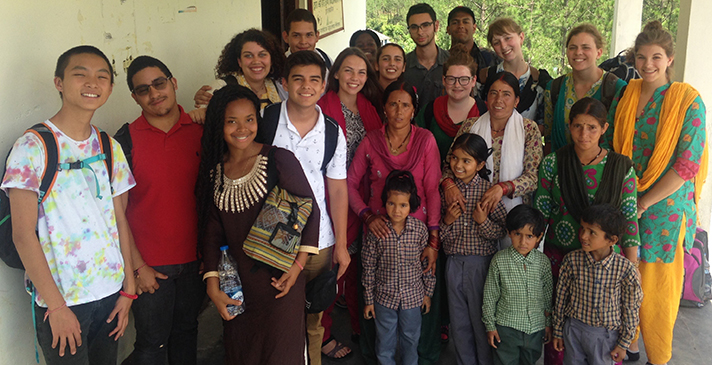With just about a week to go until the start of her senior year, Ella Streng was still feeling a bit out of sorts.
She had returned to Michigan only days before, after a month in India, where she’d had to adjust immediately to cold-water showers using a bucket; getting around on foot, in rickshaws or by squeezing her tall frame into relatively tiny vehicles; wearing traditional saris in public; and eating rice, potatoes and dal at most every meal.
“It was beautiful chaos,” she said. “I definitely fell in love with India.”
Ella learned in March that she had been awarded a full-ride “Experiment in International Living” scholarship from World Learning to study public health and community development.

Northern High Spanish Immersion teacher Sean Duffie helped Ella apply for the scholarship. The previous year she had, at Duffie’s urging, applied for and won World Learning’s Youth Leadership Program scholarship. During that trip, she traveled around the U.S., workshopping social entrepreneurship with a group of 30 that included 15 contemporaries from Belarus, an isolated dictatorship in Eastern Europe, near Russia.
Duffie called the program “insanely selective.”
“In short, by winning this second prize, it’s like she nailed getting both the Nobel Peace Prize and an Oscar,” he wrote in an email to district staff to announce Ella’s accomplishment. “This kind of lightning never strikes twice.”
Full Cultural Immersion
While in India — Ella’s first overseas trip on her own — the group of 15 teens from across the U.S. visited hospitals, schools and community centers from mountainous areas to the densely populated capital of New Delhi. They spoke with school, community and business leaders about ways those groups and institutions wanted to improve and what was preventing the improvement.
The teens stayed with host families in the Himalayas for half the trip; rode trains for many hours at a stretch, often overnight; slept in a school where they worked with students during the day; and learned to make do with Indian toilets.
“We were very immersed in the culture,” Ella said.
Ella plans a career in international affairs. It’s a goal she has had in mind since perhaps kindergarten, when her parents enrolled her (and a younger and older sibling) at Ada Vista, the district’s Spanish Immersion elementary school.
“They always wanted us to learn another language, and my dad knows a little bit of Spanish because he studied in Spain in college,” Ella said. “They just saw it to be very important that we are ‘global people.'”
Being in a language immersion school is “probably one of the top five best decisions they have made about my life,” Ella said. “It’s opened so many doors.”

More Aware of U.S. Privilege
Returning home and getting reacclimated to American culture began at the first U.S. airport they reached, by way of drinking fountains, hot water at the turn of a tap, coffee shops and toilets with seats and paper.
“Now, being back, there are things that I’ve complained about in the past that seem more trivial, like starting school earlier,” she reflected.
Ella told of a group of teenage girls they met who lived in jungle villages. They had been sponsored by a nonprofit to receive an education.
“A week after we met them, they were staying in a hostel together and the local mafia showed up,” Ella said. “They fought them off with sticks for two hours until the police came. Basically, these are girls, age 12 to 18, who are completely bad-***.
“It really put it into perspective that our standard of living in the U.S. is really a minority compared to so many parts of the world. I am definitely more aware of my own privilege.”
Ella believes seeing more of the world is making her a better student of the world.
“Day One I wrote in my journal that I was going on this trip to broaden my mind, and that definitely happened,” she said. “And at the same time it was a wake-up call, that I have so much to see, so much to learn, so many people to meet, so much time to listen, and to develop that more and more.”
CONNECT
Experiment in International Living
PBS Article: Why It’s Hard for Girls in Rural India to Stay in School










